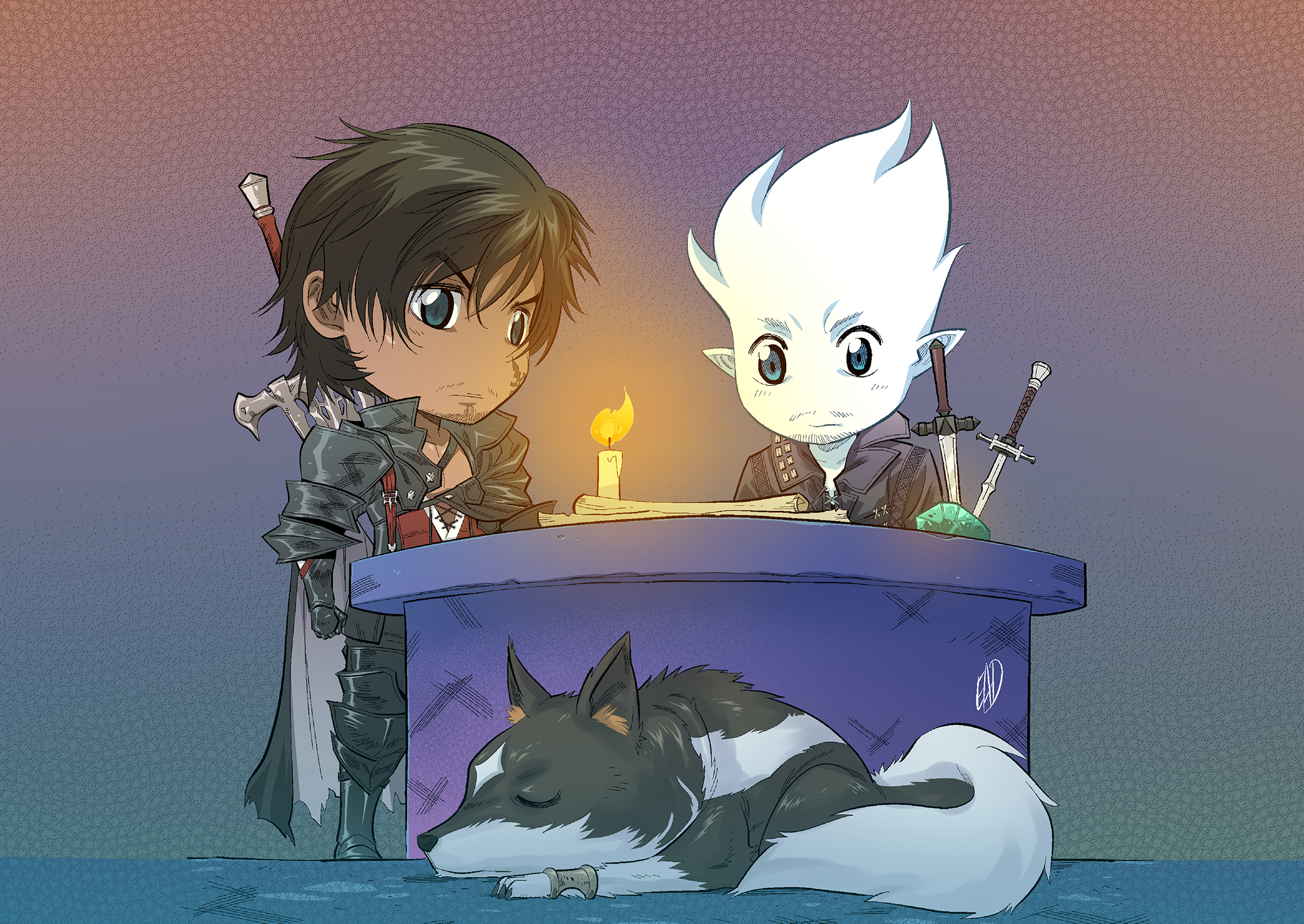Final Fantasy:
When I think about Final Fantasy I envision a Chocobo racing with a Moogle on its back, a young character wielding a sword infused with magic simultaneously casting a Firga spell. Three magical creatures, we know them as Shiva, Ifrit, and Leviathan, rush forth in aid of our hero. Meanwhile, an airship maneuvers through the skies guided by a character named Cid. All of this is accompanied by an epic musical score which will remain etched in my mind for ages to come.
When that image comes to mind I see what makes Final Fantasy for me, I am writing this review while other fans are still using social media to either criticize or defend this game. Months after its release, I want to seize this opportunity to write a review with the
aim of determining if this game truly deserves to bear the title of Final Fantasy and become a lasting gem in the franchise.
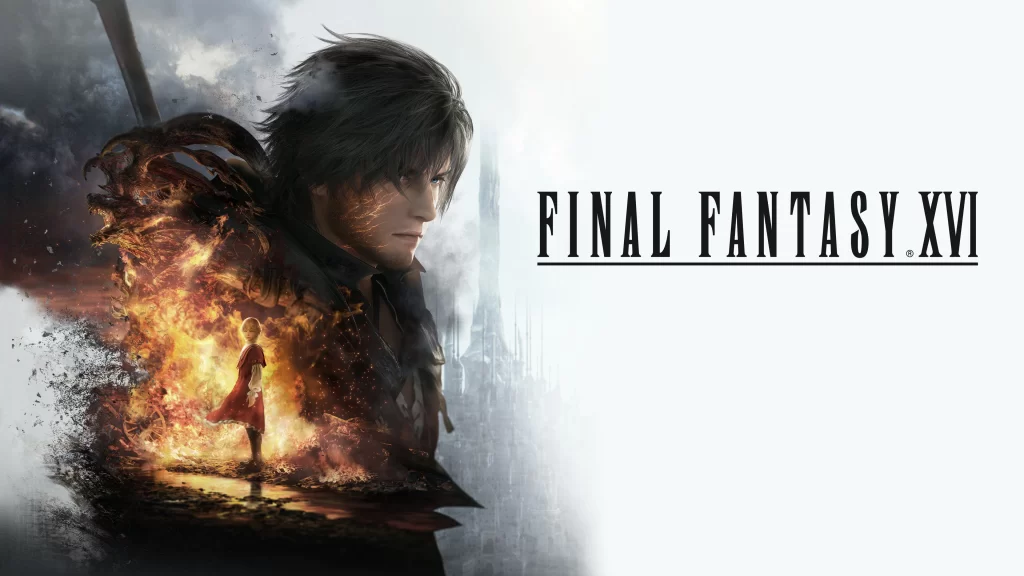
Thinking back when I was a kid, I never really cared about how Final Fantasy played. First and foremost, English wasn’t my first language; Arabic was. I would just choose whatever option looked visually appealing from the menu. I learned English through Final Fantasy (and other video games), and what really drew me in were the characters, the captivating worlds, the music, and the essence of the stories that I managed to grasp.
I wouldn’t have minded even if Final Fantasy had a game where the main gameplay is collecting monsters, like Pokemon. After all, the franchise boasts iconic creatures like Cactuars, Tonberries, and Malboros. However, I distinctly recall that as my English improved over time and I played Final Fantasy Tactics for the first time, I was entranced by the story, the writing, and the characters. As the end credits rolled, I harbored a strong desire to see an entry in the main series that embraced the same bold direction and maturity this game had.
After finishing Final Fantasy Tactics I harbored a strong desire to see an entry in the main series that embraced the same bold direction and maturity this game had.
While Final Fantasy XII attempted to venture into this territory, we all know the development troubles it faced, preventing it from fully realizing its potential. And it was until 2016 when I learned about the direction Final Fantasy XVI was going to take, and I thought, ‘Oh, finally!’
A Story Told, Actively:
From the moment I pressed the start button, I felt that eagerness I had been longing for from the very first seconds. A war was raging, chocobos were running in panic, and an epic music track sent shivers down my spine. I watched as a man at a campfire seemingly conjured water from his hands to put down the bonfire, and a few minutes later, another used a crystal to fill a cup. While I knew these details would hold significance later on, all I could think about in that moment was how they were reigniting my thirst and passion for a series I lost the passion for in quite some time.
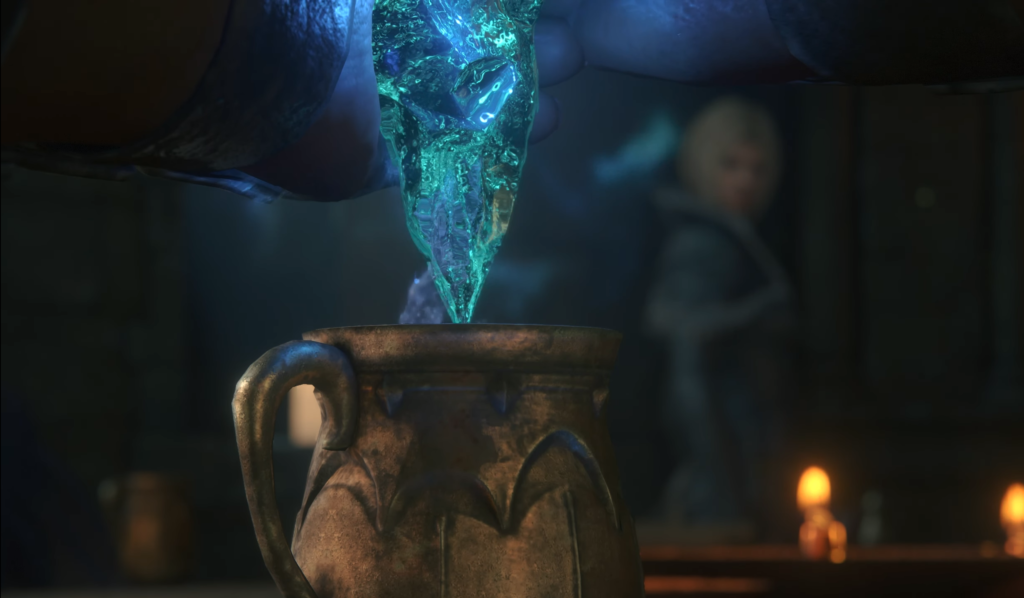
This attention to details was incredibly captivating. What amplifies its brilliance is the presence of the Active Time Lore system, which provides explanations about the main elements of the story at any given moment. For instance, when you hear something like “We did not expect the Dalmakians to attack us,” it’s easy to wonder who the Dalmakians are. However, with the press of a button, the game immediately takes you to another screen where you can read about them right at the moment they’re mentioned. It’s a brilliant concept that I hope to encounter more in games with rich lore.
Active Time Lore is a brilliant concept that I hope to encounter more in games with rich lore.
Final Fantasy XVI intricately weaves together political events, names of kingdoms and cities, names of people and their relationships, and names of significant elements which define the lore. Therefore, the introduction of the Active Time Lore was warmly welcomed. The game also introduces two other mechanics later on that further facilitate understanding the story. It even rewards you for gathering information by allowing you to level up your knowledge and win rewards for it.
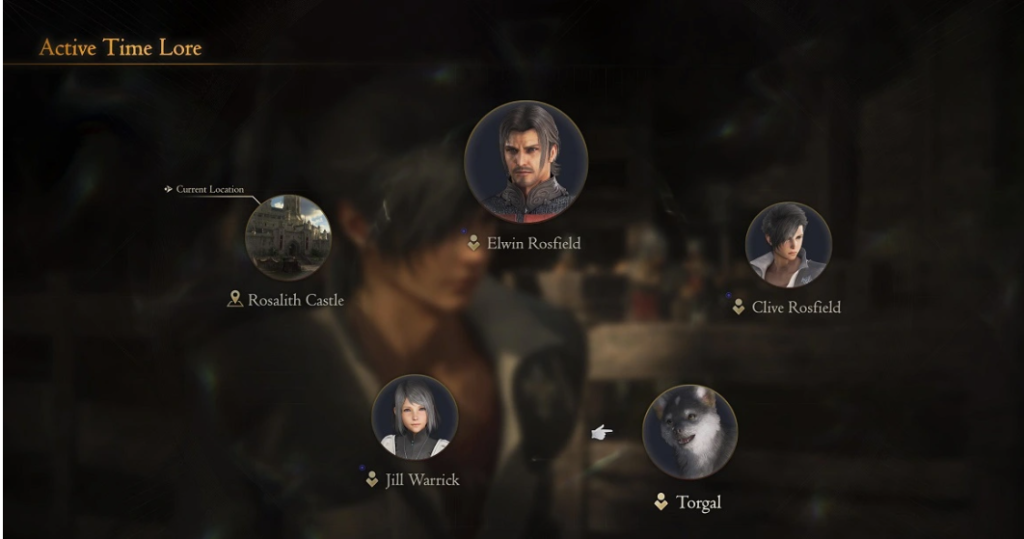
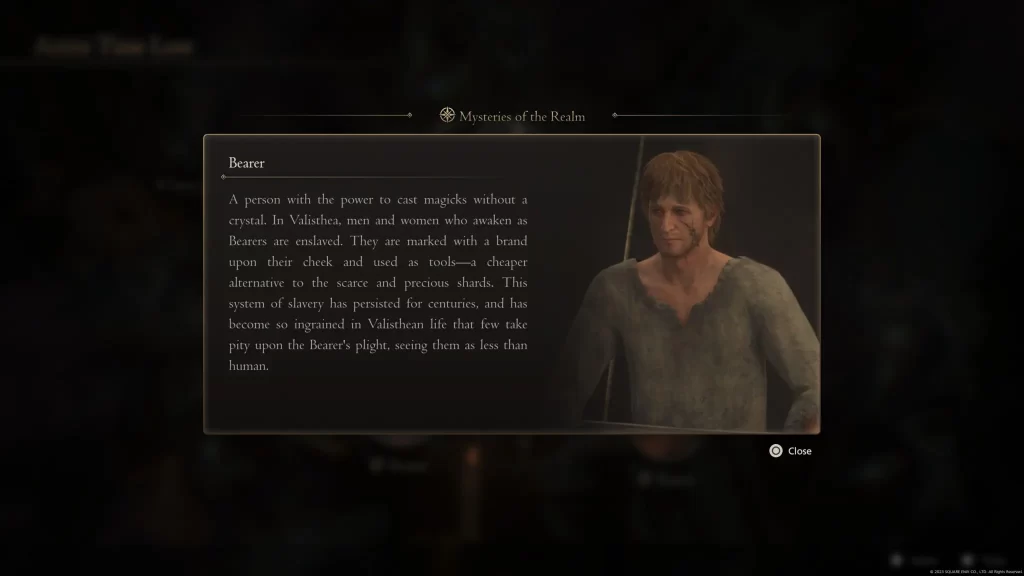
The Tale:
Let’s dive into the story, shall we? The narrative in Final Fantasy XVI revolves around themes of revenge, which gradually shift into a tale of survival and revolution. It begins with knowing that there are people called Dominants, individuals with the ability to transform into gigantic monsters known as Eikons. These creatures serve as political tools, manipulated by those in positions of power to further their agendas.
The story also tries to delve into themes which resonate with the players, such as how people’s lives are shaped by access to resources, and the impact of different political ideologies on individuals. However, at certain points, especially when the game attempts to explore these themes, it detracts from delving deeper into focusing more on the main character’s development which could have made the narrative more cohesive and engaging.
But all of that doesn’t overshadow what the story is trying to convey as a whole. The intense focus on the Eikons and their powers lends the narrative a unique perspective which can stand on its own, and I believe players will remember these Eikon battles for a long time. But I felt that while these aspects shined, the game started to suffer from a lack of substantial character development towards the end, which gave the game a dip I wished it didn’t have.
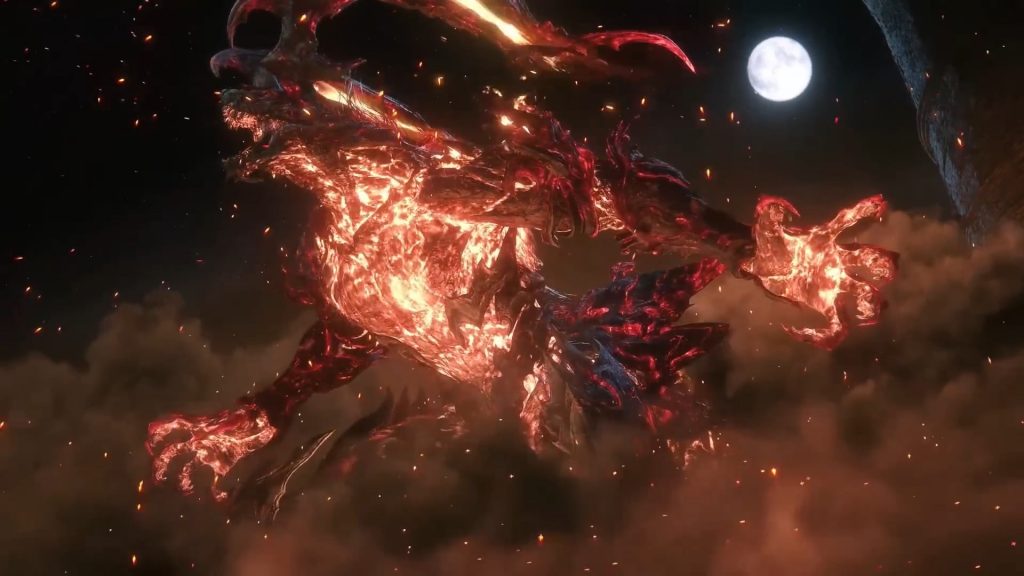
But I will give these characters their due; they are by far the best Final Fantasy characters ever written. Take Clive and Cid, for example. There’s never a moment where you wouldn’t believe in their cause or what they represent. They are well-developed, exhibiting depth, and they are very compelling. Part of the credit goes to the amazing work done by voice actors like Ben Starr and Ralph Ineson, who breathed another layer of life into the characters. Even when it comes to side characters, the game strives to give everyone a fair chance. The result of this formula was a cast that I will remember for a long time.
The characters are well-developed, exhibiting depth, and very compelling complimented by a state of art voice acting which turns them into legends.
However, as I mentioned earlier, this attempt to broaden the attention to everyone and the intense focus on the Eikons took away from some of the important key developments of characters who could have benefited from more screen time and better writing. By that, I mean the villains of the story. They failed to convince me to believe in what they were trying to convey, unlike their counterparts. That being said, the heroes do shine, and there are many key moments in the game where the quality of their writing will touch different strings of your emotions.
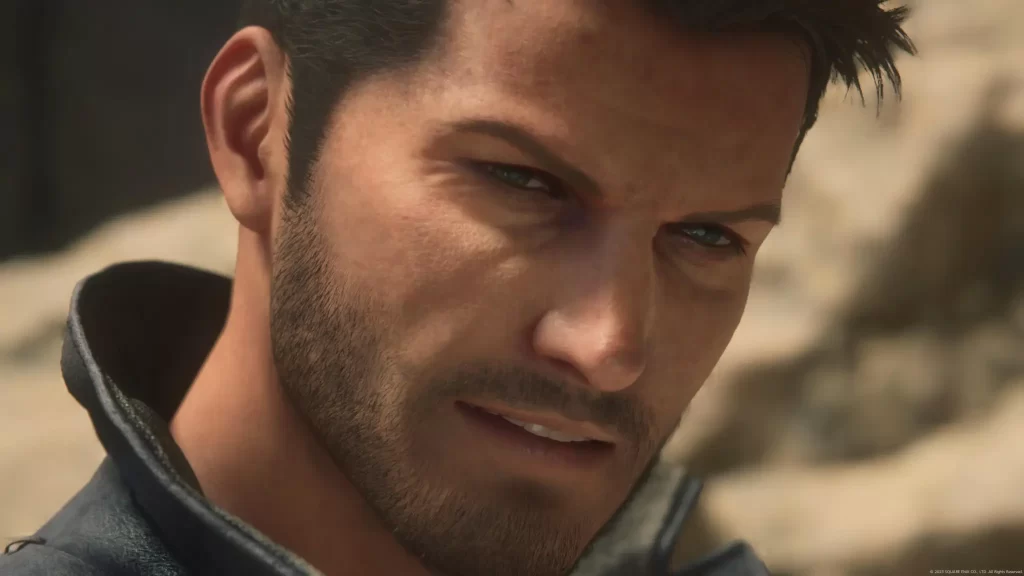
Departing From Being A RPG:
Final Fantasy XVI is through and through an action game. I understand that the development team tried to incorporate RPG elements in it, and they did, but it’s to such a minimal extent that even games like God of War have more RPG elements than it does. However, this doesn’t mean that the battle system is any less enjoyable. It stands out as one of the best action battle systems I’ve seen in the industry. It’s diverse enough and keeps introducing new skills right up until the last chapters of the game. The main credit goes to the shifting abilities that you acquire by gaining more Eikon powers.
What makes the battle system even more addicting is how forgiving it is when evading monster attacks. Perfect evading provides you with the opportunity to plunge into a monster for a follow-up or counter-attack. Some abilities are quite clever as well; you can pull an enemy into a trap or introduce extra mechanics to speed up staggering a monster thereby increasing the damage you can inflict on them. Each ability is ranked either by its strength or its ability to stagger, and you have to choose the best strategy to balance between the two styles.
The Eikon fights literally set a new bar for how fighting bosses should be in a video game. They are not only exciting and fun, but
also adrenaline-pumping and clever.
But the brightest light in battles in Final Fantasy XVI is when you’re fighting the Eikon. The Eikon fights literally set a new bar for how fighting bosses should be in a video game. They are not only exciting and fun, but also adrenaline-pumping and clever. With each fight, you’ll notice different mechanics that you have to ‘solve’ to avoid taking heavy damage. Additionally, with each fight, there are a variety of new mechanics happening, something fans of Final Fantasy XIV are very familiar with. After each Eikon battle, I found myself wanting more and I kept telling myself that this scale of gameplay is going to be very hard to beat, and rightfully so.
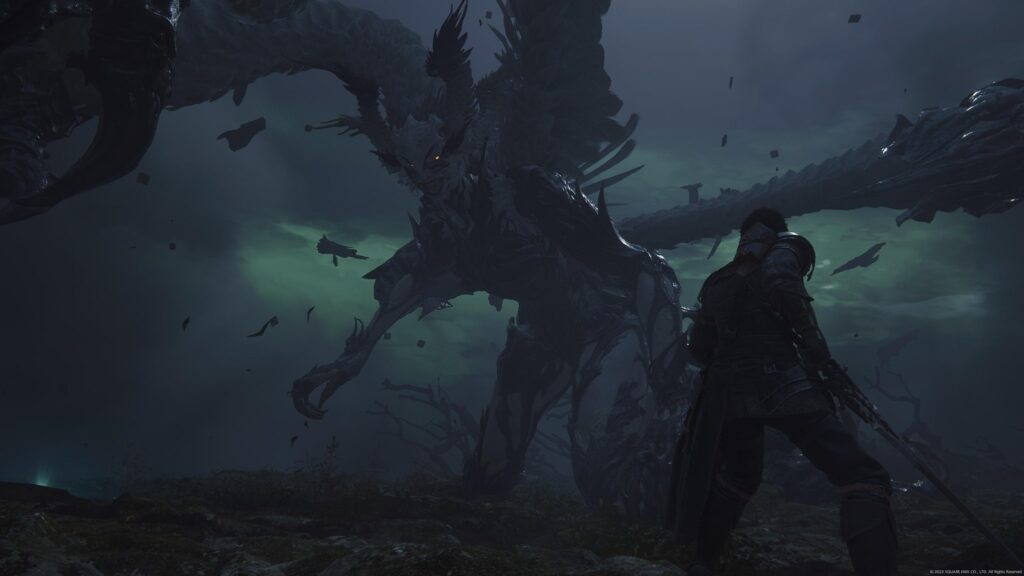
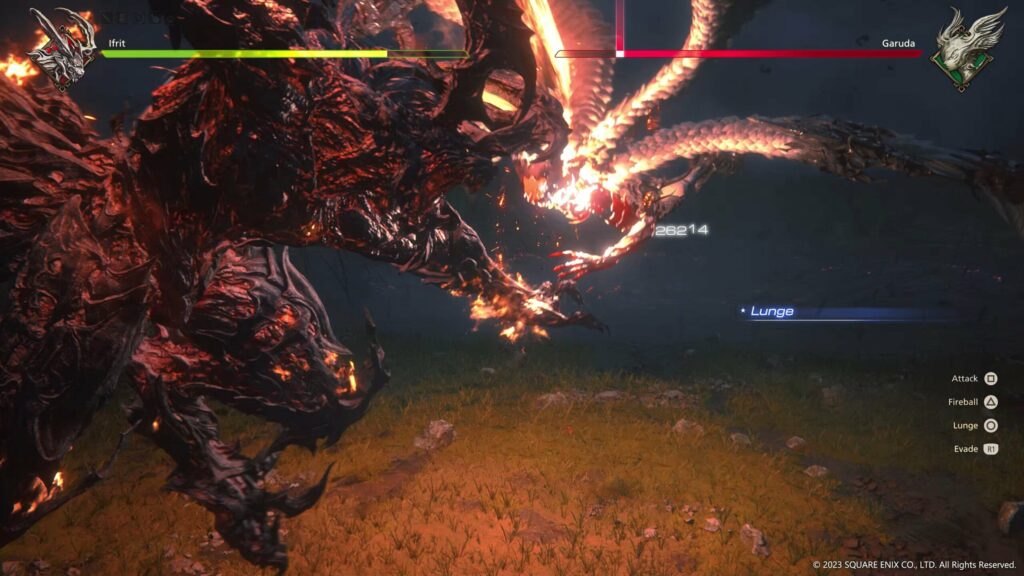
It Hits, Then It Misses:
The other aspects of the gameplay is where the game’s hits and misses reside. Although the game immerses you in one of the most appealing worlds in the series, Valisthea, with its magical ambiance and colossal crystals visible from miles away, exploring this world proves to be less rewarding. I don’t recall a moment when I was truly exhilarated to journey to the farthest reaches of the map in hopes of discovering something extraordinary. Even if you do venture out, the best you can hope for is encountering a hunt-monster that offers a bit of a challenge. Unfortunately, the accessories in the game are only mildly useful due to the game’s relative ease. Most of them, like the weapons, are acquired through crafting items at shops. While this is generally acceptable, but in a game like Final Fantasy one might hope for the thrill of stumbling upon a new accessory in a treasure chest and trying it out immediately.
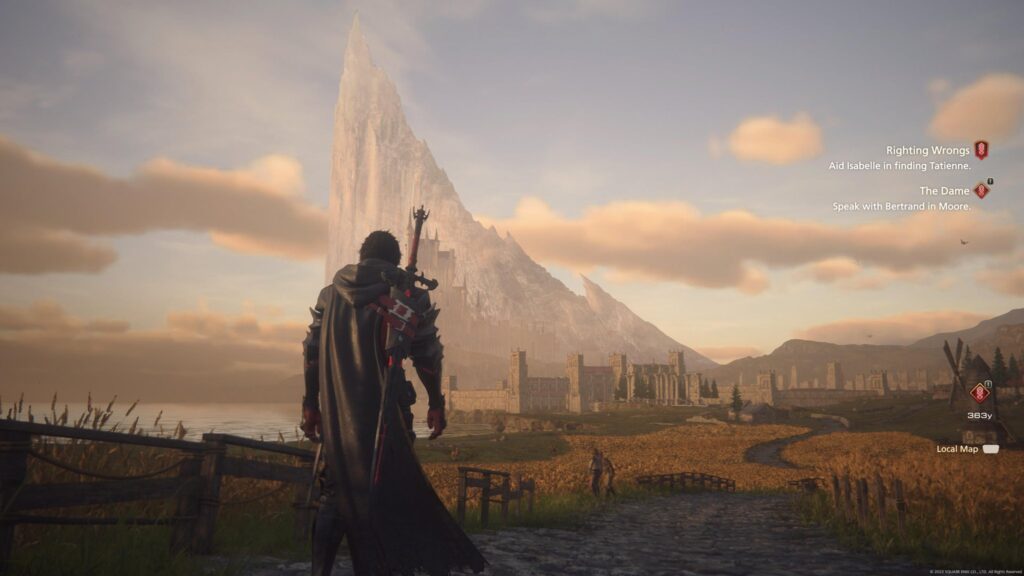
And as I mentioned earlier, the game attempts to delve into its lore, world, and characters. It achieves this by introducing you to rather lengthy quests with superb writing. However, it suffers from design flaws that make them less enjoyable to undertake. Quite often, I found myself accepting and doing these quests because I wanted to learn more about this world but I anticipated that I would not have much fun doing them. Nevertheless, the storylines which these side quests offer are no less impactful than the main plot; they feature great writing, with some of them hitting deep into the core of your emotions. I just wish they were more than mere fetch quests or battles against monsters for a saber-tooth as a grand reward.
Quests feature great writing yet I wish they were more than mere fetch quests or battles against monsters for a saber-tooth as a
grand reward.
The best aspect of the side content in terms of enjoyment was the Hunts Board. Here, you visit a board with hints about the location of a certain monster, and then you set out to fight them. Sometimes, you may even encounter them while exploring the wild. They are, in a way, tougher than normal enemies, but the overall ease of the game doesn’t make them very challenging. However, that’s not necessarily a bad thing. The game caters to new players in this regard. I know friends who kept taking on the highest-ranked hunts as soon as they became available, even though they posed a greater challenge than what they were accustomed to. Additionally, the variety of different mechanics that each hunt provides make them enjoyable to engage with, even considering how easy the game is.
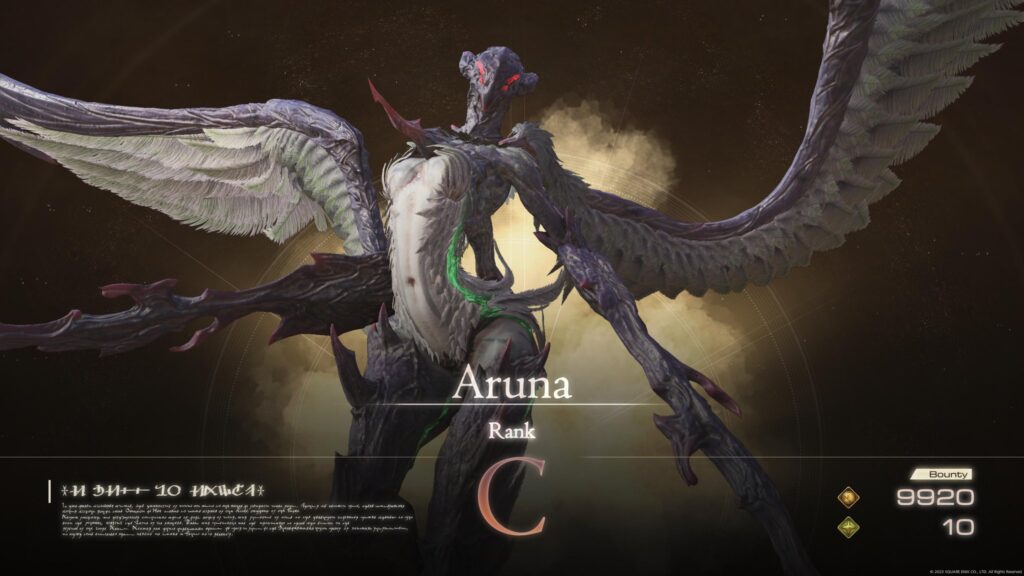
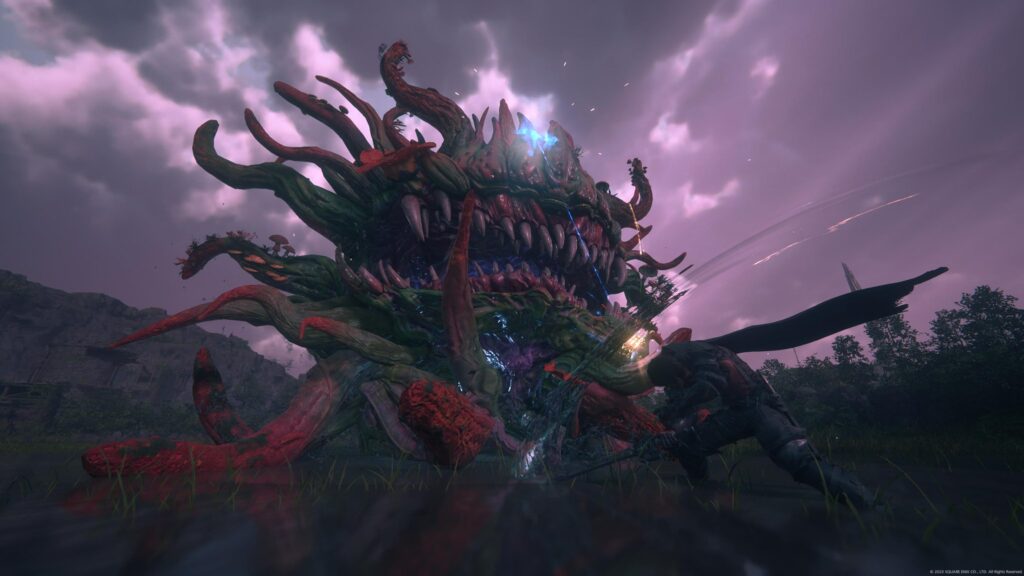
What you see, What you hear:
Another highlight of Final Fantasy XVI is the art direction and graphics. It’s a pleasure to behold, and the Eikon fights set a new definition of what the word “flashy” means. With each kingdom you visit, you’ll find a distinctive diversity in design and even in culture. The Holy Empire of Sanbreque, The Iron Kingdom, and The Dhalmekian Republic all deserve applause for the effort put into the art direction. Not to mention how stunning they appear as their cities shine in the chapters you visit.
The OST of Final Fantasy XVI deserves to be blasted through the best cinematic theater sound system in existence, it immerses you in the epic experience it aims to convey, especially during those grand
battle fights.
However, what outshines all of that is the original soundtrack for Final Fantasy XVI. Masayoshi Soken decided to go into godly mode when he composed the scores for Final Fantasy XVI. From the epicness of “Find The Flame” to the rock sound of “Do or Die,” the OST of Final Fantasy XVI deserves to be blasted through a cinematic theater sound system, immersing you in the epic experience it aims to convey, especially during those grand battle fights.
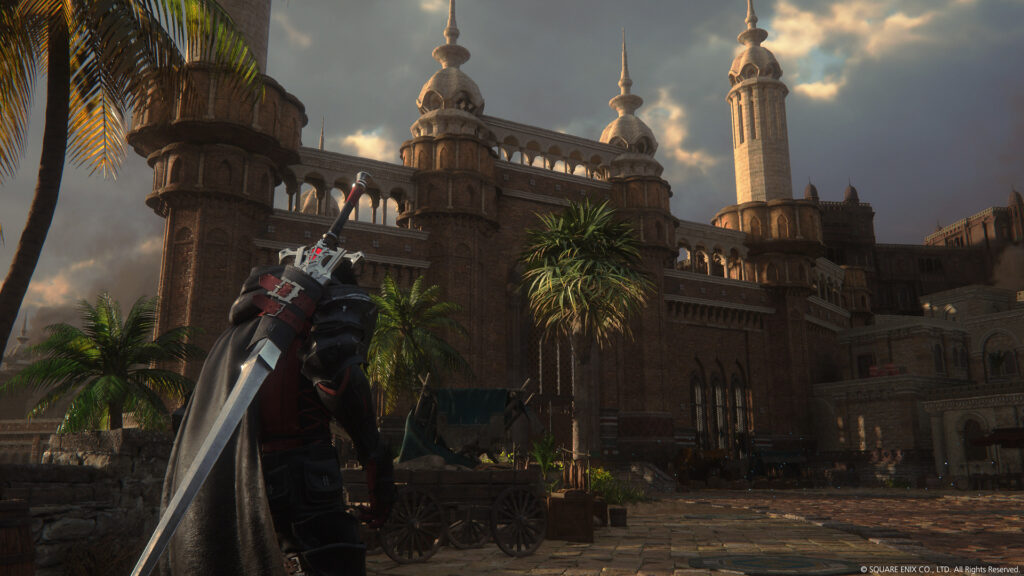
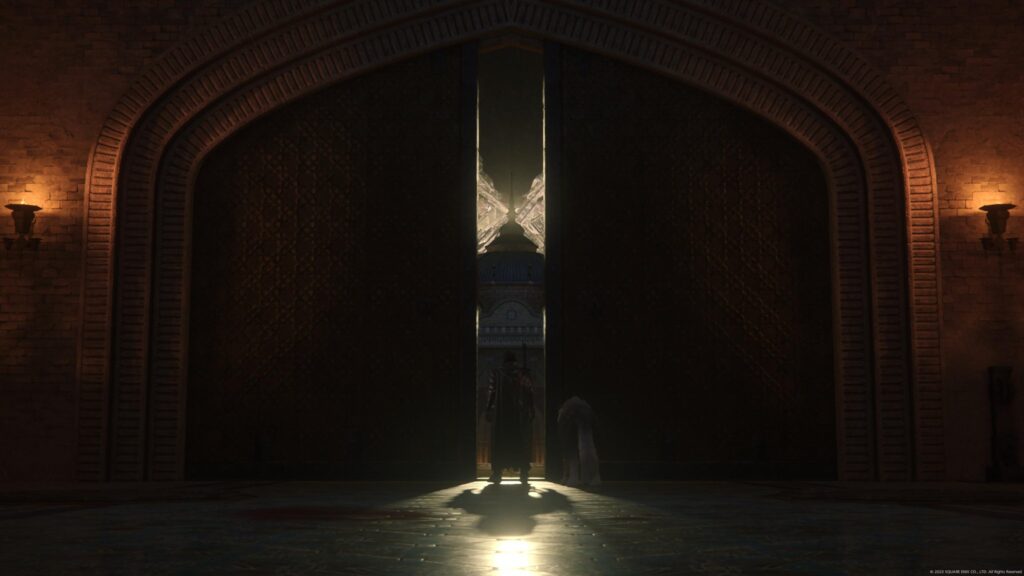
In the end, while I understand that for many players, the gameplay is hand-in-hand with what defines Final Fantasy, Final Fantasy XVI doesn’t deliver a boring or unfinished experience. It is well-made, addictive, and fun. It is indeed different, but it is definitely not in any way bad or unfitting. When you combine this with the best cast in the series, an intriguing story, godly music, the Eikons, and superb writing, Final Fantasy XVI not only deserves to be called a Final Fantasy but also to be ranked at the top with all the other elite titles. The game succeeded in winning me over as a fan, and it also excels at introducing itself to newcomers. For that reason, I would recommend this game to anyone, whether they’re already a fan or new to the series.
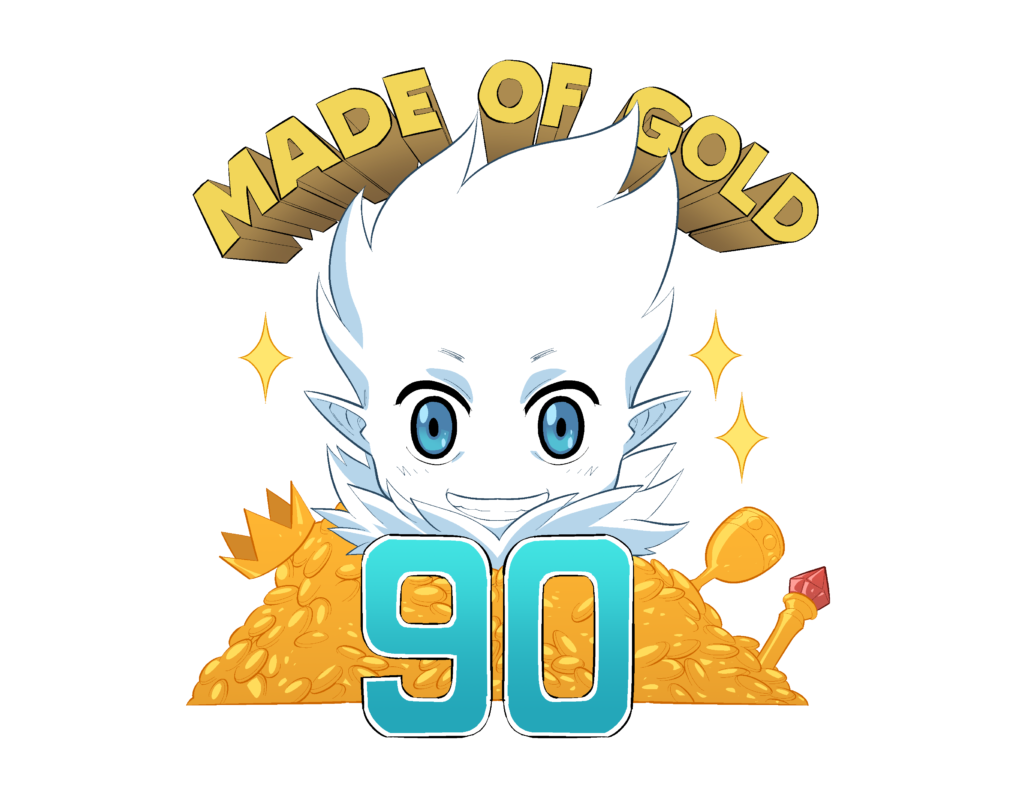

- An adrenaline-pumping story which doesn't shy away from tugging at your core emotional strings.
- Clive is a well-rounded character accompanied by an amazing cast with a legendary voice acting.
- Thrilling combat system that truly shines in epic boss battles.
- Colossal soundtrack that capture the highs, lows and the emotions of the moment.

- Quests design that should have been left in its MMORPG counterpart.
- The world design is not richly rewarding for those who take the time to explore it.
- Under-developed villains who dim the shining peaks of the story towards the end.
